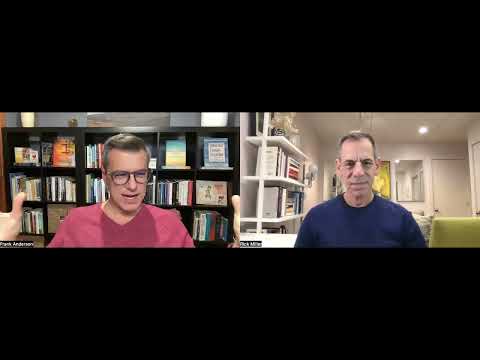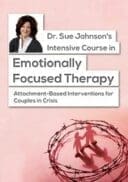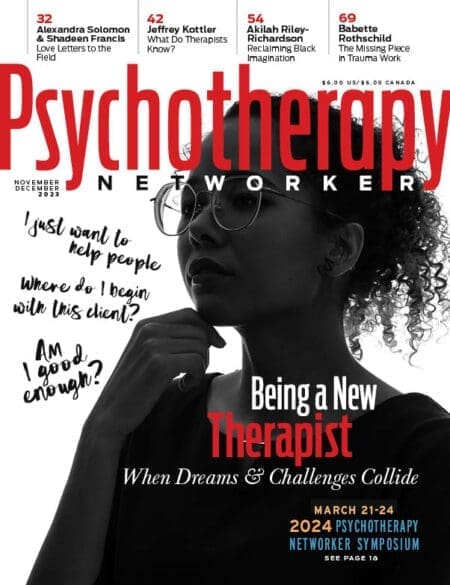The first thing you notice about trauma expert Janina Fisher is her smile. It’s a smile that has weathered years of events and experiences—many of them painful—and still retains its warmth and its joy.
Janina is one of very few practitioners who put the new concept of trauma treatment on the map, and in this interview she gives viewers a bird’s-eye view of where the field started, how it evolved, and how far it still has to go (even today, there is no trauma curriculum per se in graduate programs).
Many younger clinicians don’t realize how new the field of trauma really is. Janina’s own seminal moment came in 1989 when she first heard Judith Herman speak, and she decided at once that this would be her career path. In turn, she became part of a revolution. She says, “It really felt like we were pioneers. People were still minimizing child abuse—now we take it for granted that people understand that abuse and war are traumatic, but we were at the beginning.”
To her great frustration, what Janina found was that “classical traditional psychodynamic therapy wasn’t working for traumatized clients. They were so overwhelmed by feelings and memories.” So why didn’t the profession look more deeply into alternate ways of treating traumatized individuals? Janina gives a bit of a shrug. “We kept doing it because that’s what we were supposed to do,” she says.
What also is impressive is her willingness to share her areas of discomfort with viewers. We tend to think of all the “masters” in our profession as automatically endowed with certain skills and professional expertise, but Janina speaks of her utter anxiety around public speaking. It wasn’t until Bessel van der Kolk put her in a position where she needed to speak to a crowd that she was able to master her anxiety. Though it is still to some extent present, she’s just learned to live with it. Bessel, himself a pioneer in the treatment of trauma, was also the person who pushed Janina toward her mission. One day during her seminar at the trauma center, Bessel came in, listened to the presentation, then stood up and started clapping, telling her, “This is something you have to do.” It was an extraordinary encounter because he did not, as a rule, take part in seminars taught by any of his staff. “He’s known for being difficult, but what most people don’t know is that he has such a generous heart,” she says. Soon she was speaking with Bessel at conferences, seminars, and then going out on her own and continuing the work. “The mission for him is so important,” she says. “He sent people out into the world to carry his mission. So here I am.” Thus, over her long career, Fisher has taken problematic treatment methods—along with newer paradigms that address the reality of the trauma experience—and brought it “out into the world,” as she phrases it.
Trauma therapists can be drawn to the field because of their own unrecognized trauma, and she speaks candidly about her own past. Her mother was an incest survivor, while her father became an alcoholic when she was in her teens. Both parents were well ahead of their time: her father went into AA and went on to sponsor many other alcoholics, while her mother—extraordinarily for the 1950s—went to weekly therapy sessions. Janina learned from them that everyone is limited by their pain, but do not have to be overcome by it and can learn to grow and change.
I found myself fascinated by what she said about the field’s beginnings. At a time when the concept of drives and pathology were the norm, these pioneers were beginning to think about things differently, and I was no exception: back in the 80s when I was training, the norm and atmosphere were conservative and psychodynamic. And, irony of ironies, we were both in the same city while all this was going on.
Working with very traumatized, high-risk, decompensated clients, she developed a model—Trauma Informed Stabilization Treatment—that is proving remarkably successful. Janina worked in a state hospital where, she says, “I felt like we were freeing people fast-tracked to spending the rest of their lives in a mental institution.”
Asked for her advice for beginning clinicians, Janina’s immediate response is to “follow your heart.” The field, she points out, is still growing, with a lot of room for creativity. “Because we didn’t know about trauma, we listened to our clients. We came in saying to the client, ‘You’re the teacher, tell us about how this has affected you.’ [That’s] so different from our training.” She smiles when she adds one more piece of advice: “Don’t be afraid to be yourself.”
Watch Janina’s full interview on Secrets of the Masters.
Rick Miller
Rick Miller, LICSW, is an internationally recognized inspirational speaker, psychotherapist, and author. He is a pioneer in creating mind/body and hypnotic scripts for gay men, has trained medical and mental-health providers in creating and using them, and wrote the first-ever book on the topic. He is the founder and executive director of Gay Sons and Mothers, a nonprofit organization providing education around the powerful influence mothers have on their gay sons. He’s also created a series for clinicians, Secrets of the Masters, in which he interviews noted authorities in informal settings.
Janina Fisher
Janina Fisher, PhD, is a licensed clinical psychologist and former instructor at The Trauma Center, a research and treatment center founded by Bessel van der Kolk. Known as an expert on the treatment of trauma, Dr. Fisher has also been treating individuals, couples and families since 1980.
She is past president of the New England Society for the Treatment of Trauma and Dissociation, an EMDR International Association Credit Provider, Assistant Educational Director of the Sensorimotor Psychotherapy Institute, and a former Instructor, Harvard Medical School. Dr. Fisher lectures and teaches nationally and internationally on topics related to the integration of the neurobiological research and newer trauma treatment paradigms into traditional therapeutic modalities.
She is author of the bestselling Transforming the Living Legacy of Trauma: A Workbook for Survivors and Therapists (2021), Healing the Fragmented Selves of Trauma Survivors: Overcoming Internal Self-Alienation (2017), and co-author with Pat Ogden of Sensorimotor Psychotherapy: Interventions for Attachment and Trauma.(2015).













